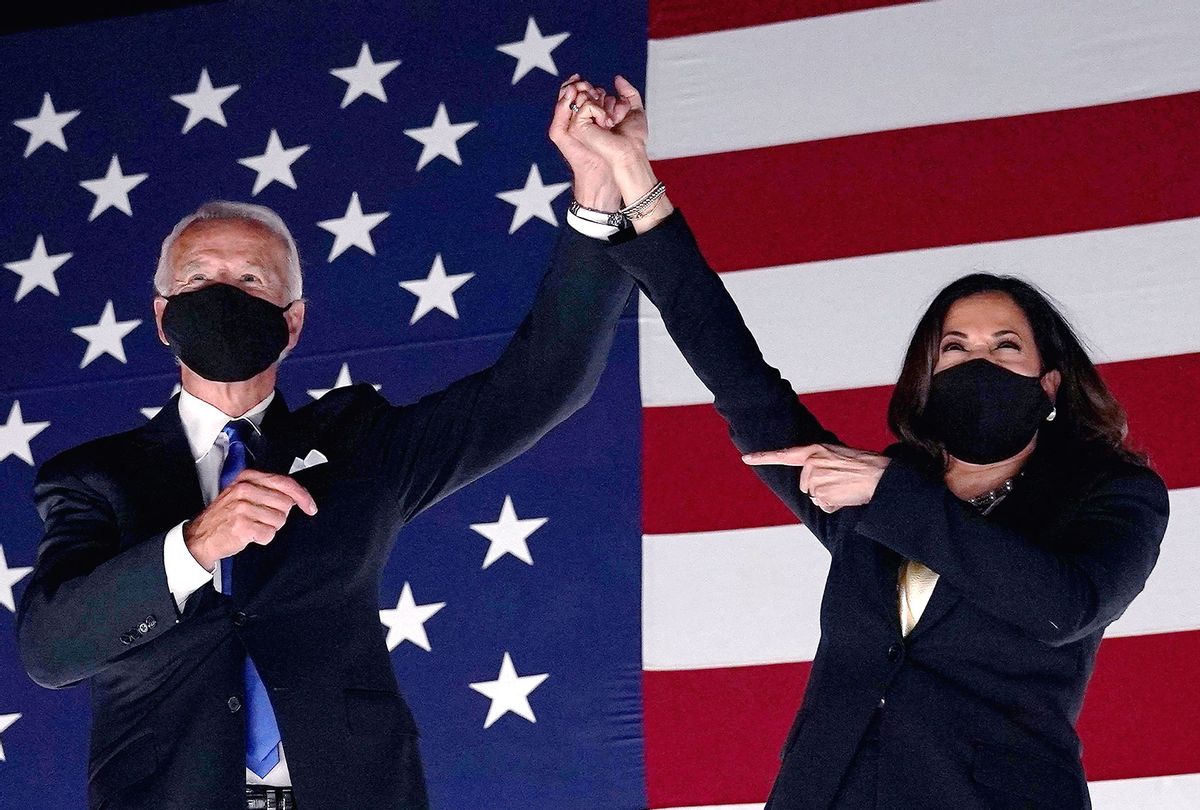Our top political reporters must be exhausted. I suggest they take some time off — like a year or two.
They are the worst people in the world to be setting the tone for a new presidency at a time of unparalleled challenges.
What the country needs now is a clean-slate, expertise-respecting, evidence-based, thoroughgoing examination of the policies required to address the pandemic, the crashed economy, climate change, systemic racism, crippling health care costs and our collapsing infrastructure — just for starters.
But political reporters hate writing about policy, because that demands actual knowledge of the subject matter. They also think it's boring, that readers don't care about it, and that it can come dangerously close to the dreaded "taking of sides."
Our top newsrooms should be focused on questions like: What are Biden's plans? Will they work? If they seem likely to work, what and who is standing in their way?
Instead, the nation's top political reporters — addicted to conflict and gamesmanship — find comfort only in storylines where there are two sides they can roughly deem equivalent.
So during the Trump years, they normalized a highly abnormal presidency — covering him as if he were not wildly incoherent, irrational, racist, thuggish and incompetent. Recognizing the truth would have been tantamount to taking sides against him and the party he had so successfully coopted.
In order to even the playing field between two parties that have wildly asymmetrical relationships with reality, political reporters hold Republicans to essentially no standards whatsoever. By contrast, some of the standards they set for Democrats are impossible.
So now their storyline is that if Joe Biden doesn't unify the nation, he will have failed.
Case in point: The latest installment of Washington Post chief correspondent Dan Balz's master class in the failed school of modern political reporting (more examples here) headlined "Biden promises to unite the country. After this election, is it even possible?"
Balz's article started off with lip service to the actual policy challenges Biden faces:
The issue agenda alone is crushing, from the coronavirus pandemic to a weakened and unequal economy, to the threats posed by climate change, to cries for an overdue reckoning on race and justice. Those are just the top layer of the president-elect's inbox and together they could consume most of his initial term in office.
But that's not what really interested him. Biden "ran promising to overcome almost exactly what he will now inherit — both deep division among the people and toxicity in the body politic," Balz wrote.
"If he fails in this overriding objective, his presidency could end up in disappointment and stasis."
Again, later: "Biden faces a series of obstacles that threaten his ability to unite the country and therefore govern successfully."
Balz grudgingly noted that Senate Majority Leader Mitch McConnell might have a bit of a role here: "The posture McConnell adopts toward Biden will go some ways in determining whether the president-elect can begin to make good on his pledge to repair a broken government and show a way out of the rancorous politics of the day."
But Balz also warned gravely of the threat from the progressive left, and how Biden will have to "referee an internecine battle at a moment when the president-elect will need as much unity and harmony within the party as possible."
Similarly, Associated Press Washington bureau chief Julie Pace set a tone for her stable of reporters with her analysis: "Biden claims a mandate that will quickly be tested."
And over at McClatchy, under the headline "Biden delivered on defeating Trump. But the honeymoon will be short," reporters David Catanese and Alex Roarty focused on conflict and optics and process, empty of substance. They wrote:
Following Joe Biden's drawn-out and hard-fought victory over President Donald Trump, he will immediately face pressure from the left and right about his proposed agenda and the roster of personnel he'll surround himself with as he prepares to govern a bitterly divided country.
NYU journalism professor Jay Rosen called out some of the problems with the "healing divisions" narrative:
Author Rick Perlstein gave CNN anchor Jake Tapper props for not buying into it:
Indeed, here is Tapper's full quote from Saturday evening:
I don't think we need to bend over backwards and pretend that the country moving on and MAGA nation moving on depends upon what Joe Biden does. Like Joe Biden is going to do what he can. And if a chunk of the leaders of the Republican Party want to drag the nation down with them, that's up to them. … But he's going to be governing and they can either join him or get out of the way.
Author Anand Giridharadas was presumably tweeting about the cable news pundit class here, but I think his critique fully extends to political reporters (some of whom, of course, are also cable news pundits). By "not taking sides," they too often are essentially siding with inertia. And this is no time for inertia.
Beat reporting, please
The people we need to hear from are the beat reporters who know what they're writing about.
The most urgent challenge, of course, is the pandemic. Biden's appointment of a heavy-hitting task force on Monday made headlines everywhere, but health writers like Lev Facher at STAT News have been digging into Biden's plans and writing about them evocatively:
Instantly, he will shoulder several herculean tasks, including a massive testing scale-up, restoring the credibility of government scientists, and overseeing the eventual distribution of hundreds of millions of vaccine doses. Perhaps most daunting, in a country plagued by apathy and misinformation: Biden will need to earn the buy-in of the American public.
Much of the work has already begun. In interviews with STAT, several Biden health advisers described a forthcoming effort to court skeptical mayors and governors, select and vet leaders for key public health agencies, and set a new tone for the nation's pandemic response, even in the 10 weeks before he takes office. …
"There are some things he's going to do right off the bat," said Nicole Lurie, a Biden campaign adviser who served as the Obama administration's top pandemic-preparedness official. "He will reach out to Tony Fauci. He will declare his intent to be an active participant in the WHO and in the world. And I believe that in very short order, he'll be in touch with governors and mayors around the country, listening to what it is that they'll need to pivot this response."
(I should point out that fully eight months ago, I called for political reporters and editors to cede pandemic coverage to journalists who cover health and science, to better serve the public's need to understand what needs to be done rather than who's winning the narrative.)
Here is AP economics writer Josh Boak laying out the problem on his beat:
The once robust recovery has shown signs of gasping after federal aid lapsed. Ten million remain jobless and more layoffs are becoming permanent. The Federal Reserve says factory output dropped.
Parents cannot return to work as childcare centers have shuttered. Restaurants and local retailers are draining whatever cash reserves are left — with many owners wondering if the next week might be their last. One in six restaurants was already closed in September, according to an industry survey.
The difficulty Biden faces:
He is expected to somehow inject enough aid to sustain workers, businesses and state and local governments, without necessarily having enough congressional partners who share his concerns.
And the possible outcome:
"The risk is that the recovery goes into reverse," said Gregory Daco, an economist for the consultancy Oxford Economics.
New York Times economic policy reporters Alan Rappeport, Jeanna Smialek, Ana Swanson and Jim Tankersley explored a number of steps Biden could take without congressional support:
That includes providing student debt relief, which Ms. Wong said would work as a sort of stimulus by removing the burden of those payments. Mr. Biden could direct the Education secretary to forgive student loans up to a certain amount. …
The administration could also use executive authority to raise the minimum wage for federal contractors to $15 an hour, she said, providing a pay boost for many thousands of workers.
And here you have three Washington Post environmental reporters — Juliet Eilperin, Dino Grandoni and Darryl Fears — writing about Biden's climate change plans:
While some of Biden's most sweeping programs will encounter stiff resistance from Senate Republicans and conservative attorneys general, the United States is poised to make a 180-degree turn on climate change and conservation policy.
Biden's team already has plans on how it will restrict oil and gas drilling on public lands and waters; ratchet up federal mileage standards for cars and SUVs; block pipelines that transport fossil fuels across the country; provide federal incentives to develop renewable power; and mobilize other nations to make deeper cuts in their own carbon emissions. ...
The new administration may be able to broker compromises with key industries that have experienced regulatory whiplash in the past decade, including the auto industry and power sector, while offering tax breaks for renewable energy that remain popular with both parties. And Biden can rebuild diplomatic alliances that will spur foreign countries to pursue more-ambitious carbon reductions.
Obviously, there are some political loose ends here and there that still need to be tied up, so maybe we can keep a few political reporters on call. But it's time to stop obsessing over the stupid questions Trump has been raising for the last four years, and start addressing the real ones.
As Mother Jones writer Ari Berman tweeted:


Shares